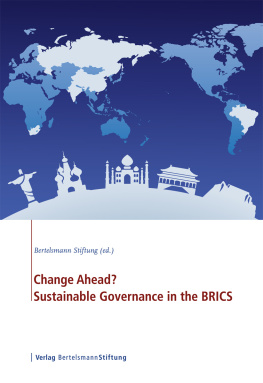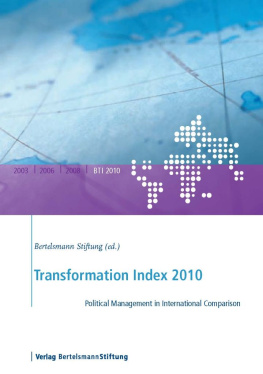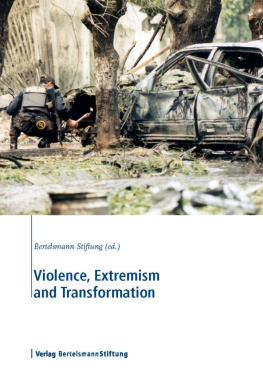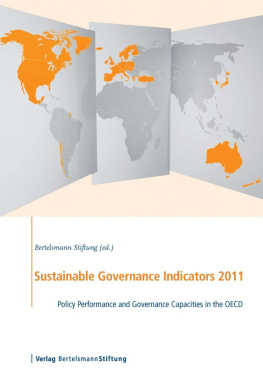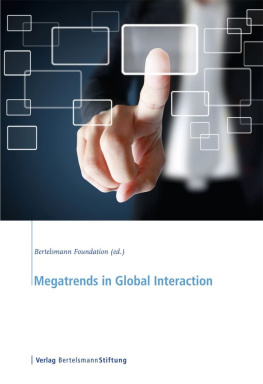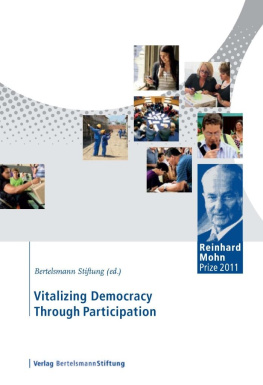Bertelsmann Stiftung (ed.)
Change Ahead?
Sustainable Governance in the BRICS
Bibliographic information published by the Deutsche Nationalbibliothek
The Deutsche Nationalbibliothek lists this publication in the Deutsche Nationalbibliografie; detailed bibliographic data is available on the Internet at http://dnb.d-nb.de .
2013 E-Book Edition
2013 Verlag Bertelsmann Stiftung, Gtersloh
Responsible: Najim Azahaf
Editing and translation: Barbara Serfozo, Berlin
Production editor: Christiane Raffel
Cover design: Elisabeth Menke
Cover illustration: Fotolia-cpauschert; Fotolia-sam; Markus Diekmann, Bielefeld
Typesetting and Printing: Hans Kock Buch- und Offsetdruck GmbH, Bielefeld
ISBN 978-3-86793-435-0 (Print)
ISBN 978-3-86793-550-0 (E-Book PDF)
ISBN 978-3-86793-551-7 (E-Book EPUB)
www.bertelsmann-stiftung.org/publications
Contents
List of Figures and Tables
Figure 21: Institutional learning
Figure 22: Citizens participatory competence
Figure 23: Media reporting
Figure 37: Public spending on education
Figure 38: Expenses-population ratio, 2010
Figure 39: Quality of math and science education, 20122013
Figure 40: School enrollment, tertiary
Figure 41: Gross expenditure on research and development as a percentage of GDP
Figure 42: Gross expenditure on research and development by sector of performance (business, enterprise, government)
Figure 43: Scientific publications, 19982009
Figure 44: Citations, publications and researchers, 2008
Figure 45: Patent family of origin and first filing office, total count by filing office
Figure 46: Royality and license fees
Figure 47: Balance of royality and license fees
Figure 48: CO2 emissions per capita
Figure 49: CO2 emissions
Figure 50: Environmental Performance Index
Figure 51: Patent applications by top fields of technology, 19962010
Figure 52: Patent grants in mechanical and electrical engineering, 20062011 total
Table 7: SGI education (indicators, mean score, rank)
Table 8: SGI research and innovation (indicators, mean score, rank)
Executive Summary
The rapid rate at which the emerging economies of Brazil, Russia, India, China and South Africa have in recent years been closing the gap with the developed world has been impressive. The popular BRICS acronym referring to these rising powers has in the last decade come to signify the major shifts underway in global economic and political relations. Yet those who assume that the patterns of growth observed in the last 20 years will continue unabated should bear in mind that the BRICS states face considerable obstacles to their individual paths of development. These obstacles include the threat of political and social instability arising from extreme social inequality and rampant corruption, as well as problems caused by an inadequate infrastructure unable to keep apace of the rapid economic growth seen in recent years. Further obstacles include massive environmental problems and the weight of demographic pressures on labor markets and education and social welfare systems.
Even if the BRICS manage to maintain their high rates of economic growth, this alone will not adequately equip them to meet the challenges ahead. Indeed, BRICS countries already marked by regional and social disparities will likely see problems associated with social inequality and environmental sustainability further exacerbated. Experience shows that only emerging powers, such as South Korea or Taiwan, that have made the right policy choices at the right stage in their economic development have managed to sustain solid growth without falling into the middle-income trap. Making good choices in this regard entails developing infrastructures, restructuring education, health care and innovation systems, as well as ensuring stable institutions and legal certainty. In fact, leaders exercising good governance use the dynamics of economic prosperity to advance the reforms underway in order to achieve sustainable growth with broad impact throughout society. However, the latest international research shows that this is precisely where more effective capacity in governance is needed.
How well do the political systems of the BRICS perform? Does each country have the institutional framework needed to advance its path of development and to effectively address needed reforms with sustainable solutions? What are the structural barriers to sustainable development within each political system? With the support of an international network of experts, the Bertelsmann Stiftung has conducted an indicator-based inventory of the state and performance of governance in each BRICS country. Focusing on 15 policy areas, including economic, labor, education, health care, social welfare, environmental and research and innovation policy, this study draws upon the analytic tool of the Sustainable Governance Indicators (SGI). This inventory allows for a systematic documentation of the need for reform in core policy areas. At the same time, the performance of each countrys system of governance, that is, the core executive and other policy stakeholders, is examined. In this way, the capacity for reform, or the extent to which individual political systems can not only identify problems, but also formulate and implement strategic solutions, is explored in each BRICS state.
Comparing each BRICS state to one another provides a profile of their individual strengths and weaknesses. This in turn yields insight into the factors driving success and the structural deficits in the political steering capabilities of each state. If we then link up in a comparative assessment the findings for reform need and reform capacity, we see considerable differences in each countrys prospects for development prospects that in some cases do not match the widespread rhetoric of growth and progress ahead. What are the development prospects for each BRICS country and how do they compare in terms of the SGI findings?
Russia Poorest performance within the BRICS group
Russia is the poorest performer within the BRICS group, with the government showing significant weaknesses in the area of steering capability. The country lags in terms of central-government strategic planning capacity, effective interministerial coordination and implementation capacity. Given the prevalence of political patronage and clientelism, the lack of involvement of independent experts and other stakeholders, and frequent contradiction in the communication of policies, forward-looking policymaking in the sense of sustainable government is practically impossible in todays Russia. Even the medium term holds little hope of improvement, as the Russian Federation is also the worst performer in the organizational reform capacity criterion, which examines institutional self-monitoring and reform capabilities. In comparing structures for the involvement and participation of civil society, only China fares worse.
India Immense problems, but a distinct national-level capacity for reform
Indias prospects are considerably more promising. The countrys economic outlook is positive thanks to its favorable demographic development. However, the SGI experts warn that optimistic growth projections are dependent on the subcontinents ability to overcome enormous social and regional disparities, modernize its infrastructure and make further progress in combating poverty through reforms in the education and health care sectors. At least at the national level, the SGI experts assess Indias central-government steering capability positively. The countrys top ranking on the criterion of strategic capacity can be explained in large part by the strategic role played by the cabinet, the technical expertise and strong coordinating function of the Prime Ministers Office, an active exchange between scholars and the government, and consultation with societal groups that is to some extent institutionalized for important policy proposals. The subcontinents government has also demonstrated tangible progress in terms of how effectively policies are implemented, although, as in China, there are significant regional disparities that require attention. In the area of governance, it is particularly important that the government do more to battle the countrys rampant corruption by strengthening oversight mechanisms.


